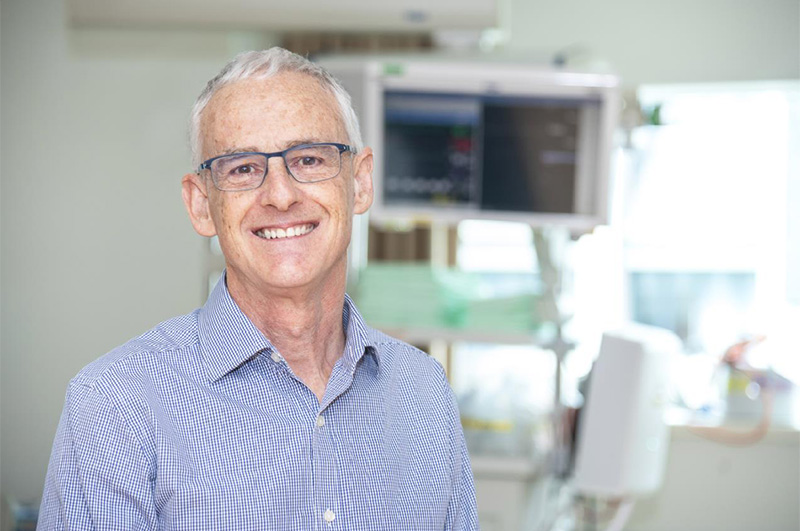MRINZ: Blood thinners effective treatment for many with COVID-19
The award-winning international trial, REMAP-CAP, led here in New Zealand by Dr Colin McArthur, Medical Research Institute of New Zealand (MRINZ) researcher and intensive care specialist at Auckland City Hospital, has provided a framework that has been able to efficiently evaluate multiple treatment options for patients who are critically ill due to COVID-19.
Early in the COVID-19 pandemic, clinicians around the world observed the common occurrence among patients of widespread blood clots and significant inflammation, which affected multiple organs leading to complications such as lung failure, heart problems, and stroke.
Doctors were unsure whether treating COVID-19 patients with preventative high doses of blood thinners, which would otherwise be given at low doses to reduce blood clots, would be safe and effective.
The REMAP-CAP platform, an ongoing, adaptive clinical trial, is the largest worldwide study of treatments for critically ill patients with severe respiratory infections, including COVID-19. The REMAP-CAP randomises patients to receive combinations of treatments, and now involves more than 7000 COVID-19 patients at more than 300 clinical sites around the world, including some of the eleven participating ICUs within New Zealand.
Combining with two other trials, the REMAP-CAP assessed the benefit of full doses of blood thinners as preventative treatment for both critically ill and moderately ill adults hospitalised with COVID-19, compared with a lower dose often used to prevent blood clots in patients in hospital care.
The studies, published on 5 August in the prestigious New England Journal of Medicine, have found that full doses of blood thinners do not improve outcomes for critically ill patients with COVID-19, and are likely to be harmful. However, for moderately ill patients, full-dose blood-thinning medication is beneficial.
With large numbers of COVID-19 patients requiring hospitalisation, this treatment is expected to improve outcomes, and reduce the pressure in intensive care units around the world.
Dr Colin McArthur says the findings are significant. “Since early in the pandemic doctors have been uncertain how to best provide preventative therapy for blood clotting complications, an important contributor to mortality from COVID-19. These study findings now make it clear that higher doses of blood thinners are beneficial for patients with COVID-19 requiring hospitalisation, but are not beneficial when patients require intensive care-level treatment. Along with other treatments evaluated by the REMAP-CAP study, these results further build our knowledge of how to best treat this disease.”
The MRINZ has played a crucial senior role in the establishment and running of the REMAP-CAP study through the leadership of Dr Colin McArthur. Adding to New Zealand’s contribution to the ongoing success of the trial, Spiral Web Solutions, based in Wellington, provide most of the database services for the global REMAP-CAP platform.
Professor Richard Beasley, director of MRINZ says, “These remarkable study findings will save lives worldwide. It’s a genuinely great achievement that New Zealand has such a strong international leadership role in the REMAP-CAP clinical trials programme that has led to this evidence, thanks in large part to the support of the Health Research Council and the Ministry of Health.”
“The dedicated work of Dr McArthur and his team here in New Zealand has contributed to an immense collaborative effort involving patients, clinicians, and research staff around the world, enabling us to rapidly learn how best to treat COVID-19. It’s an extremely complicated disease, and we’re discovering so much more about how to best treat patients with COVID-19 through these studies,” says Professor Beasley.
More information - trial details
Knowing thrombosis may contribute to morbidity and mortality in COVID-19, two open-label adaptive multi-platform randomized clinical trials were undertaken from April 2020 to January 2021 to see if full therapeutic-dose anticoagulation would improve outcomes in critically ill and non-critically ill patients with COVID-19.
Patients with severe COVID-19, defined as the requirement for organ support with high flow nasal oxygen, non-invasive ventilation, invasive ventilation, vasopressors, or inotropes, and patients with moderate COVID-19, defined as hospitalized but not requiring ICU-level organ support, were randomised to receive therapeutic-dose anticoagulation with heparin or pharmacological thromboprophylaxis as per local usual care.
The primary outcome for both groups combined survival to hospital discharge and days free of organ support through 21 days, which was evaluated with Bayesian statistical models according to baseline D-dimer level.
In patients with severe COVID-19, therapeutic anticoagulation did not improve hospital survival or days free of organ support and had a high probability of being harmful.
In non-critically ill patients with COVID-19, an initial strategy of therapeutic-dose anticoagulation with heparin increased the probability of survival to hospital discharge with reduced use of organ support.
Date posted: 9 August 2021

